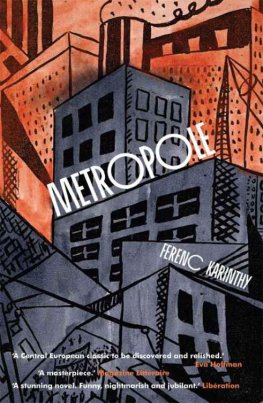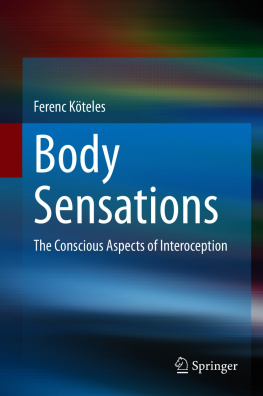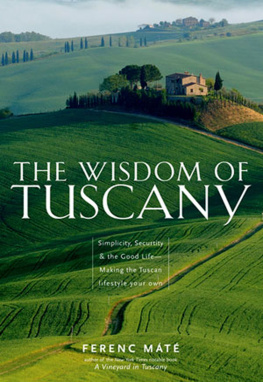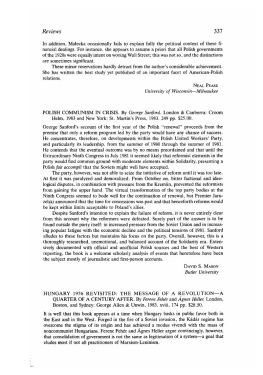Preface
Ferenc Rkczi II combined two roles not commonly conjoined: he was both prince and author. As a prince he failed; there is much about that in the present work. He used the written word to try to explain that failure, to give it meaning, and also to reconcile himself to it. This dual legacy, full of ambiguities, has exercised a lasting fascination.
The two texts published here in English for the first time overlap with each other and are closely interrelated in substance. Most conspicuously they both expose the intimate linkage, in Rkczis distinctive self-understanding, between politics and religion, reflecting the mental and spiritual turmoil of the expatriate. However, the texts differ significantly in character and accessibility.
Both were written when Rkczi, after a decade as the leader of Hungarys armed rebellion against Habsburg rule, retreated into exile, retiring to private life and to the consolations of the Catholic church. But whereas the Mmoires comprise mainly a brisk account of military campaigns and associated negotiations over war and peace, the Confessio is a devotional work in which the events of Rkczis vicissitudinous life struggle to gain autonomous expression. The Mmoires were composed in French, the then prime language of international relations, to be issued as part of a wider justification ex post facto of Hungarys war against the Habsburgs. Rkczi wrote the Confessio in Latin, then still the prime language of learned debate, but designed it for a select and intimate audience, if indeed any audience at all beside the Almighty.
*
In terms of the chronology of Rkczis life, the first part of the Confessio comes earliest, recounting his extraordinarily difficult early years, torn between the Hungarian insurgency led by his stepfather Imre Thkly and the guardianship forcibly exercised over him by the Habsburg court, all interspersed with the writers subsequent musings and repinings. This culminated in his imprisonment in Austria when he began, as a young adult, to make his own political dmarches, and in the rousing story of his escape and first emigration. Then, in 1703, the thread of the narrative passes to the Mmoires.
This is anyway probably the best place for an average reader to start. The Mmoires are a fairly straightforward and uninterrupted account of the rebellion of the suffering populace of Hungary against their Austrian rulers, as witnessed by its duly appointed leader, who also shows himself its most perceptive analyst. What a tale it is and finely told! but a complicated and confused one. Actually there were two separate but linked theatres of war. Revolt broke out in northern Hungary, on the vast estates of the Rkczi family there. Thence it quickly spread across much of the rest of the kingdom. Meanwhile the uprising flared up to the east in Transylvania, a distinct province under the same Hungarian crown, where Rkczis ancestors had ruled in the previous century as autonomous princes. Rkczi himself provides a brief introduction to this scenario, at the start of his narrative for the year 1704. In the event, Rkczi accepted election as independent princeps in Transylvania, an action that would prove pivotal for the rest of his life. In Hungary his powers remained those of leader (dux), but not sovereign, even after the Habsburgs had been formally deposed in 1707.
Rkczi records his personal view of events, with a sharp eye for detail. He is sensitive to faults and foibles on both sides, especially his own. He pens notable vignettes of his generals and other close associates, often in unflattering terms (but the closest of all, Count Mikls Bercsnyi, is portrayed with real sympathy). Rkczi reveals himself a critic of Hungarian society. He perceives on the one hand the failings of his fellow aristocrats, selfish and unprepared for command; and on the other hand the sufferings of the peasants, which has filled them with boundless hatred for their noble masters as much as for their Habsburg ruler.
All this contributes to make the campaign for the lost liberties of Hungary and Transylvania, in Rkczis depiction, a shambles. It is a chronicle of indecisive skirmishing; of ill-disciplined troops; of groups and individuals continually changing sides. In the very same years as Blenheim and Ramillies, Oudenarde and Malplaquet further west, Hungary saw hardly any pitched battles. Instead it endured a succession of sieges, often protracted, and mainly decided by incompetence or perfidy. When Rkczi adduces a parallel with Caesars Bellum Gallicum, he casts himself as leader of the Gauls.
Against this background political events played themselves out. For his civilian dealings Rkczi casts himself in a role that is more conciliatory and constructive, as in his measures to alleviate popular distress and his mediation between Protestants and Catholics at the diet of Szcsny. Yet here too anarchy is never far below the surface witness the shocking scenes at the ensuing diet of nod and Rkczis authority gradually faded away, as he lost control of efforts to secure a peace deal. He refused to accept the resultant accord at Szatmr. At all times Rkczi had been a pawn in a larger European diplomatic game, and he slips off into exile at the end of the Mmoires still convinced that his erstwhile French allies or his prospective Russian ones can enable him to turn the tables.
*
At this point, in 1711, the main story is taken up again by the Confessio: Rkczi describes his continuing efforts to pursue the cause of Hungarian independence at a distance, first in Poland, later in France, and finally in Turkey. However, the Confessio belongs to an altogether more challenging genre for the modern reader. If Rkczis self-reproaches in the Mmoires seem on the whole refreshing and insightful, in the Confessio they can become wearisome and even excruciating. Here he plays out his spiritual dilemma, in a strikingly candid way, but with much literary artifice, whose sources are carefully analysed in Gbor Tskss excellent commentary. Rkczi turns to advantage his complex religious inheritance. His ancestors as princes of Transylvania were Calvinist (and Thkly was a Lutheran): hence Ferenc IIs keen awareness of spiritual autobiography in puritan and pietist mode, which had some distinguished practitioners there; whereas his wide reading in Catholic devotional and mystical literature yielded further models for his introspection.
Rkczi views history as the unfolding of providence. The framework for his own share in that providence is the widespread contemporary perception that the oppression and conflict suffered by Hungary were a product of the nations sinfulness. In answering its need for redemption Rkczi follows what he believes to be a divine calling as political and military leader; yet when he fails, despite his apparent best efforts, that must also be Gods judgment. Destiny seems to work for him like a satnav continually needing to recalculate its instructions in the face of an erratic driver.











